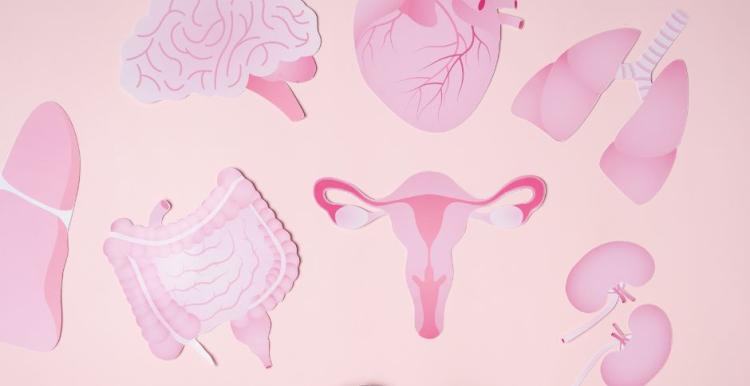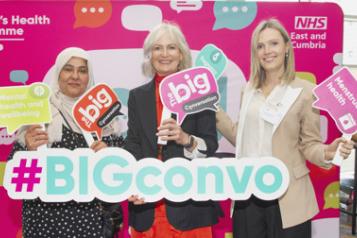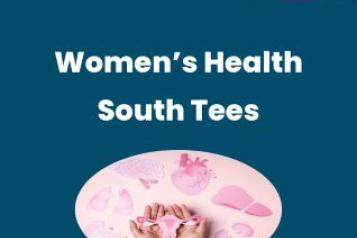£25 million for women's health hub expansion

- £25 million new funding allocated to create new women’s health hubs, as part of the Women’s Health Strategy for England
- New hubs to reduce pressure on secondary care, waiting lists and tackle health inequalities
Women across England will benefit from tailored healthcare and support by new women’s health hubs - improving access and quality of care for services for menstrual problems, contraception, pelvic pain, menopause care and more.
A £25 million investment over the next 2 years will accelerate the development of new women’s health hubs to benefit women across England and help to ease pressures facing the NHS.
The hub models will be tailored to meet local women’s needs. They will focus on delivering services in the community that better fit around women’s lives and streamline access to women’s health services. Hubs aim to address fragmentation in provision, for example by providing management of contraception and heavy bleeding in one visit, or integrating cervical screening with other aspects of women’s health care. At the moment, women often need to attend multiple appointments and go to different places to access these essential services.
As well as improving women’s experiences of healthcare, hubs can create longer-term savings for the NHS through improving access to preventative care and reducing pressure on secondary care services.
Health and Social Care Secretary Steve Barclay said:
As we celebrate International Women’s Day, it is important we look back on the real progress made on the rollout of our Women’s Health Strategy - including making hormone replacement therapy more accessible and supporting women’s reproductive health in the workplace.
New funding of £25 million for women’s health hubs - which provide tailored services for women including menopause care, menstrual health and contraception - mean more women can get the right support that works around their daily lives.
Minister for Women’s Health, Maria Caulfield said:
Women make up 51% of the population and should not be an afterthought in healthcare.
Better access to specialist services is key to tackling health inequalities - the £25 million funding will create new women’s health hubs providing specialist care and advice to women across the country.
We are making excellent headway to meet our commitments set out in England’s first ever Women’s Health Strategy, aiming to boost the health and wellbeing of women and girls.
Early adopter women’s health hubs already exist in England including in Liverpool and Manchester. These have been well received by women in their area and are offering a significant increase in appointments for long-acting reversible contraception, alongside other services such as menstrual health, menopause, and pelvic floor care.
Other existing hubs make use of digital models to tackle inequalities in access to care and ensure services are delivered efficiently. These include City and Hackney women’s health hub which is leading the way with virtual menopause engagement events and group consultations, with follow up in a physical location hub where needed.
Based on consultation with more than 100,000 people across England, the Women’s Health Strategy sets out an ambitious ten-year plan for improving the health and wellbeing of women and girls and reforming how the health and care system listens to them.
As part of this, Professor Dame Lesley Regan was appointed as the Women’s Health Ambassador. Her role is instrumental in raising the profile of women’s health, increasing awareness of ‘taboo’ topics, and supporting implementation of the strategy’s priorities.
Professor Dame Lesley Regan, Women’s Health Ambassador:
As a practicing gynaecologist, I have first-hand experience of how important it is for women to have easy access to the right care when they need it.
Although a woman’s health needs change during her life course, most of them are predictable. It is crucial that we provide her with the best information and support at each and every stage of her journey.
Women’s health hubs offer us the opportunity to provide holistic care - including contraception, help with period problems, early pregnancy problems, pelvic pain, menopause and cancer screening. Timely access to high quality services will help to build women’s confidence in the healthcare system.
Expanding women’s health hubs across England is a key commitment in the first ever government-led Women’s Health Strategy for England, with an initial aim to see at least one hub in every integrated care system (ICS).
The Department of Health and Social Care is working collaboratively with stakeholders across the health and care system to develop resources to support local creation of women’s health hubs, including a best practice guide, possible care pathways for local adoption, case studies and a cost benefit analysis. This will be published in due course.
Expanding women’s health hubs is one of ministers’ top priorities for the first year of implementing the Women’s Health Strategy. The 8 priorities are:
- Encouraging expansion of women’s health hubs to improve women’s access to services and to create efficiencies for the NHS
- Improving information provision on women’s health, including improvements to the NHS website and supporting teachers to deliver women’s health elements of the relationships and sex curriculum
- Supporting women’s health in the workplace, including through the Health and Wellbeing Fund 2022 to 2025.
- Pregnancy loss, including through reporting findings of the independent Pregnancy Loss Review and developing the pregnancy loss certificate
- Fertility, including improving access to NHS fertility treatment for female same-sex couples and assessing the use of non-clinical access criteria locally
- Improving access to hormone replacement therapy (HRT) by introducing the HRT prescription prepayment certificate in April 2023 and boosting HRT supply
- Healthy ageing and long-term conditions - with work feeding into the government’s forthcoming major conditions strategy.
- Boosting research and evidence into women’s health
NHS chief executive, Amanda Pritchard, said:
For too long, too many women have felt that their pain has been ignored, misunderstood or downplayed when they approach health professionals for help.
The NHS is continuing to find ways to ensure women’s health is prioritised, that more focus is placed on their needs, and that access to the care they need is as convenient as possible - whether that’s for menstrual problems, menopause or contraception.
So it is fantastic, particularly on a day where we are recognising women, that this new funding will be made available to support the NHS to expand these one stop shops across the country.
They are already making a huge difference where they are up and running and will hopefully go a long way in improving the health and experiences of women.
This comes following last week’s announcement that the government has appointed a Department of Work and Pensions Menopause Employment Champion. Helen Tomlinson will work with employers to ensure women affected by the menopause are properly supported in the workplace.
Background information
Find further information on the Women’s Health Strategy England.
For ongoing NIHR funded evaluation of women’s health hubs see Women’s Health Hubs from the University of Birmingham.
For primary care women’s health forum case studies, see Women’s Health Hub Toolkit case studies (PDF, 137KB).


